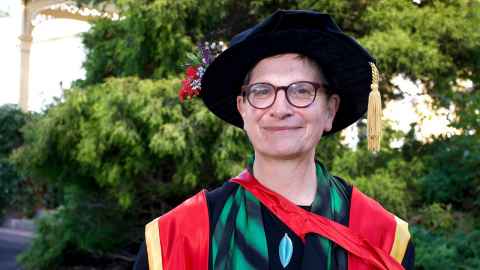Writing the Treaty into our lives in one sentence
14 May 2019
A remarkable turning point in the direction of New Zealand education was the inspiration for a recent PhD graduate's doctoral thesis.

Dr Rose Yukich, who graduated from the University of Auckland's Faculty of Education and Social Work last Friday, says she became fascinated by one phrase in an official education document from 30 years ago: 'The curriculum will honour the promises of the Treaty of Waitangi to the Māori people on Māori language and culture.'
This ground-breaking sentence belongs to a 1987 report that came out of a two-year ministerial inquiry into curriculum, led by a group of Māori and Pākehā teachers and public servants, some of whom she interviewed.
“I was interested in the social and political conditions that made it possible for that Treaty sentence to be written,” she says. “Prior to this report, the Treaty as a force able to influence education policy, let alone practice, wasn’t thinkable.”
One of the inquiry’s most significant innovations was to write a set of national curriculum principles, or overarching values, to inform curriculum design in every school. At the heart of one of those was the Treaty sentence.
“I became curious about what motivated and inspired these educators and officials to draw upon the Treaty when they were not required to. At the time there were no government directives on the Treaty,” she says.
It’s hard to imagine today that in the mid-1980s, only a handful of publications about the Treaty existed. “Claudia Orange’s seminal book didn’t appear until the inquiry had ended, whereas now, more than 4000 texts of various kinds are now available on the Treaty, and there are numerous resources and policy requirements related to the Treaty in the education sector.”
The Treaty’s presence is not automatic or required by law in
compulsory schooling; we have to invest in it and pay attention to it.
She hoped insights gained from this earlier era might be useful today for teachers and school leaders wanting to revisit the place of the Treaty in the life of their schools, with her conclusions centring on what she calls the Treaty’s ‘connect-ability’.
“The Treaty entered a national curriculum principle for the first time because of how its moral force tapped into other concerns. Two strong points of Treaty connection for the people I spoke with were relationships and student learning.”
She defines relationships as “the goings-on between people kanohi ki te kanohi (face-to-face) whether on marae, at workplaces or in the personal realm”.
She says the Treaty became attached to “pre-existing Māori-Pākehā collegial associations and friendships with all their attendant pleasures and difficulties”.
“What Pākehā members of the group learnt from these relationships encouraged an openness to bicultural imperatives and struggles for a fairer education system. They grew into willing supporters of their Māori colleagues in advocating for public education that included Māori language and culture, and that welcomed students’ cultural identities and histories into the school environment. The Treaty connected to those aspirations.”
Dr Yukich encourages today’s educators to view the Treaty not as “something cold and legalistic imposed from upon high, but as offering a supportive framework that connects to what school communities already care about; as well as being a spur to reflect on their progress in engaging effectively with Māori students as learners”.
She says it's worth remembering that the Treaty only has a place in current national curriculum policy because its inclusion has been fought for, and insisted on.
“The Treaty’s presence is not automatic or required by law in compulsory schooling; we have to invest in it and pay attention to it.”
She believes Pākehā educators need to keep learning about the shared past with Māori to better understand their responsibilities towards the Treaty relationship, as well as its potential to enhance their work. Recent interest in ensuring New Zealand history is taught in schools echoes this concern.
“The Treaty isn’t just a Māori document about Māori stuff. Māori signed up to the Treaty but they didn’t write it. It’s about relationship, and the struggle of relationship. It was about the future when it was first signed and it’s still about the future. As in 1987, the Treaty continues to serve as an ethical prompt for policymaking and practice in education."
Dr Yukich is a postdoctoral fellow based in the sociology department in the Faculty of Arts. She is working on Tāngata Tiriti, a Marsden-funded project that explores the engagement of non-Māori with the Treaty across a range of professions.
Media inquiries
Julianne Evans | Media adviser
Mob: 027 5625868
Email: julianne.evans@auckland.ac.nz